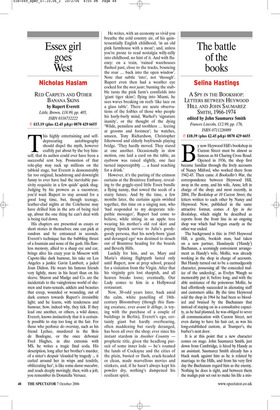Essex girl goes West
Nicholas Haslam
RED CARPETS AND OTHER BANANA SKINS by Rupert Everett Little, Brown, £18.99, pp. 405, ISBN 0316732222 ✆ £15.19 (plus £2.45 p&p) 0870 429 6655 This highly entertaining and self deprecating autobiography should dispel the myth, however craftily put about by the boy himself, that its author could ever have been a successful rent boy. Promotion of that role-play may rack up millions on the tabloid stage, but Everett is demonstrably far too original, headstrong and downright funny to ever have had the inevitable passivity requisite in a few quids’ quick shag. Judging by his prowess as a raconteur, you’d want Rupert to stay around for a good long time, but, though teenage, leather-clad nights at the Coleherne may have drilled him in the arts of being tied up, about the one thing he can’t deal with is being tied down.
His chapters are presented as essays or short stories in themselves; one can pick at random and be entranced in seconds. Everett’s technique has the bubbling thrust of a fountain and none of the gush. His flawless memory, allied to a sharp eye and ear, brings alive his crazy year in Moscow with Capote-like dark humour, his take on Los Angeles a junkie Gavin Lambert, a jaded Joan Didion. He wears his famous friends very lightly, more in his heart than on his sleeve. Sharon and Madge and Co. are the incidentals to the vainglorious world of shemen and trans-sexuals, addicts and beauties that creep, wounded or wounding, out of dark corners towards Rupert’s irresistible light; and he learns, with tenderness and humour, how, indeed why, they tick. If they lead one another, or others, a wild dance, Everett, knows instinctively that it is certainly possible to stay too long at the fair. For those who perforce do overstay, such as his friend Lychee, murdered in the Bois de Boulogne, or the once debonair Fred Hughes, in dire extremis with MS, he writes a tragic final coda. His description, long after her brother’s murder, of a sister’s despair ‘clouded by tragedy ... it curled around her in wisps and tendrils, obliterating her’, is like some danse macabre, and reads deeply movingly; then, with a jolt, you remember its Donatella Versace. He writes, with an economy so vivid you breathe the cold country air, of his quintessentially English childhood, ‘in an old pink farmhouse with a moat’; and, unless you’re prone to read nostalgia willy-nilly into childhood, no hint of it. And with fluency: on a train, ‘ruined warehouses flashed past, close to the tracks, bouncing the roar ... back into the open window’. Note that subtle ‘into’, not ‘through’. Rupert even then had a weather eye cocked for the mot juste; burning the stubble turns the pink farm’s cornfields into ‘giant tiger skins’; flying into Miami, he sees waves breaking on reefs ‘like lace on a glass table’. There are acute observations of the foibles of those who people his hurly-burly mind, Warhol’s ‘signature inanity’, or the thought of the dying ‘Wilde, penniless and toothless ... leering at grooms and footmen’; he watches, unseen, Tony Richardson, Christopher Isherwood and elderly boyfriends playing bridge. ‘They hardly moved. They stared at one another. Occasionally in slow motion, one laid a card on the table, an eyebrow was raised slightly, one face turned imperceptibly ... a hand reaching for a drink.’ However, it’s the parting of the crimson curtains at the Braintree Embassy, revealing to the goggle-eyed little Essex bundle a flying nanny, that sowed the seeds of a starry future. And by the time, a few months later, the curtains again swished together, this time on a singing nun, who ‘had responded to my desperate telepathic messages’, Rupert had come to believe, while sitting in an apple tree wearing his mother’s old red skirt and paying lipstick service to Julie’s goodygoody persona, that his newly-born ‘giant and deranged ego’ was destined to slouch out of Braintree heading for the boards and Beverly Hills.
Luckily for him, and us, Mary and Maria’s shining flightpath lasted only until Rupert, now at prep school, prayed for a visitation from the Virgin. After that his virginity gets lost sharpish, and all heaven breaks loose; eventually, Our Lady comes to him in a Hollywood restaurant.
Now, 30-odd years later, back amid the calm, white panelling of 18thcentury Bloomsbury (though this flaming creature, ever avant le déluge, is toying with the purchase of a couple of buildings in Berlin), Everett’s ego, certainly giant but hardly overbearing, often maddening but rarely deranged, has been all over the shop; ever since his instant stardom in Another Country prophetic title, given the headlong pursuit of some inner lode — he’s roamed the lands of Cockayne and the cities of the plain, busted or flush, crack-headed or clean, made marvellous movies and stinkers, and, if he hasn’t always kept his powder dry, nothing’s dampened his resilient spirit.


















































































 Previous page
Previous page